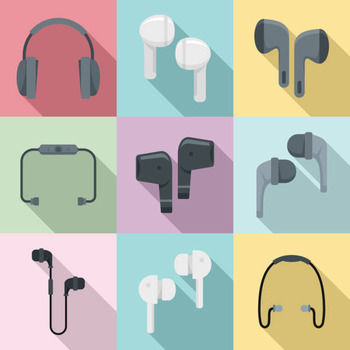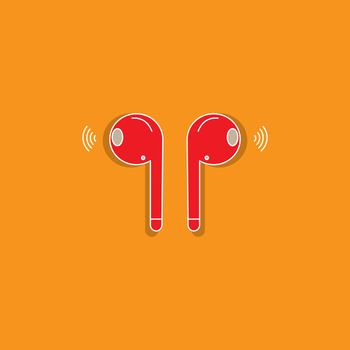Jasper Lastoria is a new writer at Bluetoothmag.com and has been a musician for the past 20 to 25 years. Jasper Lastoria writes informational and...Read more
No, not all wireless earbuds use Bluetooth technology. While Bluetooth is the most frequently used wireless technology for connecting earbuds to gadgets, other wireless technologies are also available. Some wireless earbuds use alternative wireless technologies such as Wi-Fi or proprietary wireless protocols.
Bluetooth has become the standard for wireless audio transmission due to its widespread compatibility, power efficiency, and usefulness. Most wireless earbuds today, including popular models like AirPods, use Bluetooth to connect to smartphones, tablets, and computers.
However, it’s worth noting that specialised wireless earbuds or headphones may be designed for specific purposes, such as gaming headsets that use a dedicated wireless transmitter or receiver instead of Bluetooth.
In outline, while Bluetooth is the multiple prevalent wireless technologies for earbuds, not all wireless earbuds exclusively rely on Bluetooth, and alternative wireless technologies are available for specific use cases.

Can You Get Wireless Earbuds Without Bluetooth?
Wireless earbuds without Bluetooth connectivity are relatively rare, as Bluetooth is the most widely used wireless technology for audio transmission in consumer electronics. However, there may be some alternatives available trusting on your specific requirements.

One alternative to Bluetooth wireless earbuds is earbuds that utilize other wireless technologies, such as Wi-Fi. These earbuds connect to devices through Wi-Fi networks instead of Bluetooth. However, Wi-Fi-based earbuds are less common and often require specific Wi-Fi networks or routers.
Another possibility is earbuds that use proprietary wireless protocols. Some companies develop their wireless technologies to provide connectivity between their devices. These proprietary wireless earbuds may come with a dedicated transmitter or receiver to establish a wireless connection, but they are typically limited to use within their specific ecosystem.
The availability of wireless earbuds without Bluetooth will likely be more limited compared to Bluetooth-enabled options. When looking for wireless earbuds, it’s advisable to check the product specifications and characterizations to determine the specific wireless technology they use.
What is the contrast between true wireless and Bluetooth?
“true wireless” and “Bluetooth” refer to different aspects of wireless audio technology. Here’s a breakdown of the differences between the two:

Bluetooth is a wireless communication standard that authorises devices to reach and exchange data over short distances. It is a widely adopted technology for various purposes, including audio transmission. Bluetooth enables smartphones, tablets, and computers to connect to wireless audio devices such as headphones, earbuds, and speakers.
Bluetooth technology establishes a wireless connection between devices and transmits audio signals. It functions on radio waves and uses specific profiles, such as the Advanced Audio Distribution Profile (A2DP), to transmit high-quality audio wirelessly.
- True Wireless
“True wireless” refers to a specific type of wireless audio technology related to earbuds or headphones without any physical wires connecting the two earpieces. True wireless earbuds are designed to work independently, each functioning as a standalone device. They do not require a wire or cable between the left and right earpieces.
True wireless earbuds typically use Bluetooth technology to establish a wireless connection to the audio source device. They rely on Bluetooth for transmitting audio signals between the device and each earbud independently.
Bluetooth is a wireless communication standard that ables devices to connect and exchange data, including audio, over short distances. True Wireless, on the other hand, refers to earbuds or headphones with no physical wires connecting the earpieces. True wireless earbuds often use Bluetooth technology to establish a wireless connection and transmit audio signals between the device and each earbud.
Which Bluetooth version is best for earbuds?
When it comes to determining the best Bluetooth version for earbuds, it depends on various factors, including the specific features and requirements of the earbuds and the intended usage. Here are some key Bluetooth versions to consider:
- Bluetooth 5.2
Bluetooth 5.2 is the latest version available as of my knowledge cutoff in September 2021. It offers improvements in data transfer speed, range, and efficiency compared to previous versions. It also introduces features like LE Audio, which provides enhanced audio quality and support for multiple audio streams. Bluetooth 5.2 is suitable for those looking for the latest advancements in wireless audio technology.
- Bluetooth 5.0 and 5.1
Bluetooth 5.0 introduced significant improvements over old versions, including faster data transfer rates, longer range, and better power efficiency. Bluetooth 5.1 introduced precise location and direction-finding capabilities. Both versions are widely adopted and provide excellent performance for wireless earbuds.
- Bluetooth 4.2 and 4.0
Bluetooth 4.2 and 4.0 are older but still widely used. They offer reliable connectivity and support for most audio streaming requirements. While they may provide a different range or speed than newer versions, they are generally sufficient for everyday usage.
When selecting earbuds, it’s important to consider the Bluetooth version and their specific features and capabilities, such as battery life, audio quality, and additional functionalities like active noise cancellation (ANC). It’s recommended to review the product specifications and user reviews to ensure the earbuds meet your specific requirements and expectations.
Is Bluetooth safe for the Internet?
Yes, Bluetooth is generally considered safe for internet connectivity. Bluetooth is a wireless communication technology designed for short-range communication between devices. It is commonly used to connect devices like smartphones, tablets, laptops, and IoT (Internet of Things).
Bluetooth technology uses encryption protocols to secure the data transmitted between devices, ensuring that the information exchanged over Bluetooth connections remains private and protected. Encryption helps prevent unauthorized access or interception of data.
However, it’s important to note that, like any wireless technology, Bluetooth connections can be vulnerable to certain security risks if not properly configured or if devices are not up-to-date with the latest security patches. It’s advisable to keep your Bluetooth devices updated with the latest firmware or software updates to address any security vulnerabilities that may arise.
Additionally, connecting to trusted and secure networks is recommended when using Bluetooth for internet connectivity. Avoid connecting to unfamiliar or unsecured Bluetooth networks, which may threaten your privacy and security.
Bluetooth is generally considered safe for internet connectivity and data transmission when used correctly and with appropriate security measures.
What features should I look for in wireless earbuds?
When looking for wireless earbuds, consider several key features based on your preferences and needs. Here are some vital elements to look for:
Sound Quality.
Look for earbuds that provide high-quality audio with balanced sound and good bass response. Considerations and specifications can give you insights into the sound signature of different earbud models.
Comfort and Fit.
Consider the earbud design and fit. Look for earbuds with different ear tip sizes or customizable options to ensure a comfortable and secure fit in your ears.
Battery Life.
Check the battery life of the earbuds and the charging case. Longer battery life allows for extended use without frequent recharging. Also, believe how quickly the earbuds can be recharged.
Connectivity.
Ensure that the earbuds use wireless technology compatible with your devices. Most earbuds use Bluetooth, but confirm the Bluetooth-supported version and compatibility with your smartphone, tablet, or other devices.
Controls and Features.
Evaluate the commands known on the earbuds. Some models have touch controls, physical buttons, or smart features like voice assistants or touch gestures for easy playback, volume, and calls command.
Water and Sweat Resistance.
If you plan to use earbuds during workouts or outdoor activities, consider models that offer water or sweat resistance. Look for an IPX rating indicating the water or sweat resistance level.
Active Noise Cancellation (ANC).
ANC technology helps reduce external noise for more immersive audio knowledge. Consider whether ANC is a priority for you and if the earbuds you’re interested in offer this feature.
Compatibility with Voice Assistants.
Some earbuds have built-in support for popular voice assistants like Siri, Google Assistant, or Alexa, allowing you to control your devices hands-free.
Price and Value.
Consider the price of the earbuds and evaluate their features and overall value for the cost. Compare different models to find the most reasonable balance between price and features that meet your requirements.
User Reviews and Ratings.
Read user reviews and ratings to get insights into other users’ real-world performance, durability, and overall satisfaction with the earbuds you are considering.
It’s essential to prioritize your most important features and align them with your budget and intended usage to find the wireless earbuds that best suit your needs.
Why do people prefer earbuds?
There are several grounds why people prefer earbuds over other types of headphones. Here are some common reasons:
- Portability
Earbuds are small and lightweight, making them highly portable. They can be carried in pockets, purses, or bags with little space. This portability makes them convenient for people who are frequently on the go or prefer compact audio solutions.
- Discreetness
Earbuds are less conspicuous compared to over-ear headphones. They fit directly into the ears, which can be more visually discreet, especially in public settings. It makes them a popular alternative for people who want to listen to audio without drawing attention to themselves.
- Comfort
Earbuds often provide a comfortable fit for many users. They come with different sizes of ear suggestions or customizable options to accommodate various ear shapes and sizes. The lightweight design and absence of headbands or clamping force can make them more comfortable to wear for extended periods.
- Active Lifestyles
Earbuds are suitable for active lifestyles and physical activities. Their small form factor and secure fit make them less likely to fall off or get in the way during workouts, running, or other sports activities. Some earbuds also suggest water or sweat resistance, catering to active users.
- Convenience
Earbuds typically offer features like wireless connectivity, touch controls, and compatibility with voice assistants. These features enhance the comfort of using earbuds by eliminating cables and providing easy access to playback controls, call management, and voice commands.
- Compatibility
Earbuds are generally compatible with various devices, including smartphones, tablets, laptops, and other audio sources that support Bluetooth or other wireless connectivity options. This versatility makes them proper for different devices without needing adapters or specialized connectors.
- Price Range
Earbuds come in a wide range of price points, offering options for various budgets. They are available at different prices, from budget-friendly options to high-end models with advanced features. This affordability makes them accessible to a broader range of consumers.
It’s critical to note that personal preferences may vary, and some individuals may prefer other types of headphones based on their specific needs, sound preferences, or comfort requirements.
Are all wireless earbuds Bluetooth-enabled?
No, not all wireless earbuds use Bluetooth technology. While Bluetooth is the most standard wireless technology for earbuds, alternatives like Wi-Fi or proprietary wireless protocols exist.
How do Bluetooth earbuds work?
Bluetooth earbuds use wireless technology to connect to devices like smartphones or tablets. They transmit audio signals from the gadget to the earbuds using Bluetooth radio waves.
What is the range of Bluetooth earbuds?
The range of Bluetooth earbuds typically extends up to 30 feet (10 meters) from the connected device. However, the content can vary based on environmental attributes and the Bluetooth version.
Do Bluetooth earbuds require a separate receiver or transmitter?
No, Bluetooth earbuds do not require an additional receiver or transmitter. They have built-in Bluetooth technology, connecting directly to compatible devices.
Can I use Bluetooth earbuds with non-Bluetooth devices?
It depends on the non-Bluetooth device. If the gadget has a headphone jack or supports audio output via an adapter, you can connect Bluetooth earbuds using a Bluetooth transmitter.
Can I connect Bluetooth earbuds to multiple devices simultaneously?
Some Bluetooth earbuds support multipoint connectivity, permitting you to connect them to multiple devices simultaneously. However, not all models offer this feature, so check the product specifications.
Do Bluetooth earbuds have a latency issue?
Bluetooth earbuds may have a slight audio latency due to the wireless transmission. However, advancements in Bluetooth technology have significantly reduced latency in modern earbud models.
How do I pair Bluetooth earbuds with my device?
To pair Bluetooth earbuds, ensure they are in pairing mode, encourage Bluetooth on your device, and select them from the available devices list. Follow the specific instructions provided with the earbuds.
Can I use Bluetooth earbuds for phone calls?
Yes, Bluetooth earbuds can be used for phone calls. They typically have built-in microphones and call management characteristics, allowing you to answer calls, adjust volume, and end calls directly from the earbuds.
Are Bluetooth earbuds compatible with all smartphones?
Bluetooth earbuds are compatible with most smartphones that support Bluetooth connectivity. However, checking the specific Bluetooth version and compatibility necessities of the earbuds and your smartphone is advisable.
Final Thoughts:
No, not all wireless earbuds use Bluetooth technology. While Bluetooth is the most common wireless technology for earbuds, alternatives are available. Some wireless earbuds use other wireless technologies like Wi-Fi or proprietary protocols. Bluetooth earbuds are widely functional and compatible with a range of devices. Still, it’s important to check the specifications of each pair of wireless earbuds to ensure they use the desired wireless technology.

More related articles:
- Skullcandy Crusher Wireless Headphones Specs
- How to Charge Bluetooth Earbuds in 2023
- How To Connect Isotunes Earbuds
- How To Pair Isotunes Pro Earbuds To iphone
- Are Bluetooth Earbuds Good For Gaming

Jasper Lastoria is a new writer at Bluetoothmag.com and has been a musician for the past 20 to 25 years. Jasper Lastoria writes informational and reviews articles on Bluetoothmag. He tests many headphones, speakers, stereo systems and Earbuds for his music production, so he has vast experience in using all these things.
- Latest Posts by Jasper Lastoria
-
Jitterbug Phone troubleshooting
- -
Earbuds For Construction Workers In 2024
- -
Where Bluetooth is Used
- All Posts
